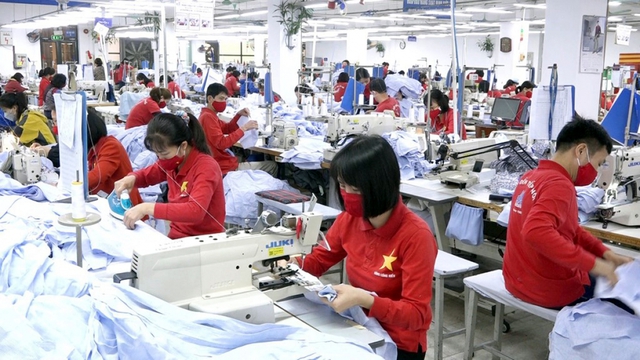
Workers at a textile factory in Đồng Nai Province. VGP Photo
HÀ NỘI — Vietnamese businesses supplying goods and services to major European clients face a new wave of scrutiny as the European Union and member states introduce tougher supply chain due diligence regulations, participants heard at a VCCI workshop in Hà Nội yesterday.
In recent years, the EU and countries such as Germany, France and the Netherlands have enacted or proposed laws requiring large companies to identify, prevent and remedy human rights and environmental risks across their global supply chains. Vietnamese suppliers, whether providing raw materials, manufacturing, processing or logistics services, are therefore likely to come under closer observation.
VCCI Deputy Secretary-General and Head of the Legal Department Đậu Anh Tuấn emphasised that Europe, the world’s second-largest consumer market, remains one of Việt Nam’s most important and promising export destinations, particularly with the implementation of the Việt Nam-EU Free Trade Agreement (EVFTA). Amid rising trade tensions elsewhere, notably in the United States, the European market is increasingly vital for Vietnam’s diversification strategy.
However, Tuấn warned that new legal requirements on ‘supply chain due diligence’ are becoming an integral part of sustainable trade policy in Europe. While these regulations mainly apply to large companies, their effects extend to all participants in those companies’ supply chains—including suppliers, processors and logistics providers, regardless of size.
“To maintain existing contracts and secure new export orders from major European partners, Vietnamese enterprises must understand and cooperate closely with those partners to comply with these legal requirements,” he said.
A recent VCCI survey found that 59.3 per cent of Vietnamese exporters to the EU had never heard of supply chain due diligence regulations, while another 36.6 per cent had heard of them but did not understand their content. Only a small proportion had a clear and accurate grasp of what the EU and member states now require.
The workshop introduced key aspects of the EU’s Corporate Sustainability Due Diligence Directive (CSDDD) and Germany’s Supply Chain Due Diligence Act (SCDDA). These laws establish obligations for large companies to monitor human rights, labour conditions and environmental impacts not only in their own operations but also across suppliers worldwide.
Researcher Trần Minh Thu explained that these frameworks define who is subject to the regulations, outline major obligations and penalties for non-compliance, and clarify how such rules could affect exporters in sectors such as textiles and footwear. She presented a VCCI report titled ‘European Supply Chain Due Diligence Regulations and Impacts on Vietnam’s Exports,’ which aims to raise awareness among Vietnamese stakeholders and suggest adaptation strategies.
Key sectors
Former Director of VCCI’s WTO and Integration Centre Nguyễn Thị Thu Trang analysed how Vietnamese exports could be affected, especially in the textile and footwear industries, two key sectors for Việt Nam’s trade with the EU. She noted that any enterprise involved in supplying, transporting, or distributing goods and services linked to EU-based companies will likely fall within the scope of due diligence requirements.
Affected suppliers will need to demonstrate compliance with strict standards on human rights, labour conditions and environmental protection. Beyond basic legal compliance, they must also show proactive measures to prevent and mitigate risks, not merely respond after violations occur.
Trang added that these regulations adopt a broader understanding of human rights than existing Vietnamese law, covering living conditions, housing, safety, privacy and environmental standards affecting communities. If a Vietnamese supplier fails to meet these requirements, its goods may still be exported, but European partners could face penalties, potentially leading to suspension of contracts or loss of future orders.
Speakers and experts agreed that Vietnamese enterprises engaged in export supply chains, especially those connected to major EU or German firms, must act promptly to safeguard their long-term competitiveness.— VNS